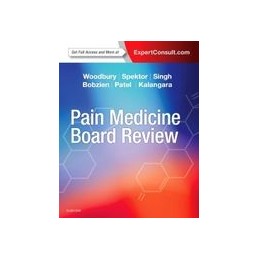- Obniżka


 Dostawa
Dostawa
Wybierz Paczkomat Inpost, Orlen Paczkę, DHL, DPD, Pocztę, email (dla ebooków). Kliknij po więcej
 Płatność
Płatność
Zapłać szybkim przelewem, kartą płatniczą lub za pobraniem. Kliknij po więcej szczegółów
 Zwroty
Zwroty
Jeżeli jesteś konsumentem możesz zwrócić towar w ciągu 14 dni*. Kliknij po więcej szczegółów
Well-written and expertly reviewed, this practical question-and-answer resource by Drs. Anna Woodbury, Boris Spektor, Vinita Singh, Brian Bobzien, Trusharth Patel, and Jerry Kalangara, prepares you for certification or recertification in Pain Management. Nearly 850 questions, with answers and concise explanations throughout, test the knowledge you need for success on the American Board of Anesthesiology exam.
Opis
PART 1. GENERAL CONSIDERATIONS
1. The History of Pain Medicine
2. Taxonomy and Classification of Chronic Pain Syndromes
3. Organizing an Inpatient Acute Pain Service
4. Measurement-Based Stepped Care Approach to Interdisciplinary Chronic Pain Management
5. The Health Care Policy of Pain Management
6. Quality Assessment and Improvement and Patient Safety in the Pain Clinic
7. Education, Training, and Certification in Pain Medicine
PART 2. BASIC CONSIDERATIONS
8. Pain Pathways: Peripheral, Spinal, Ascending, and Descending Pathways
9. A Review of Pain-Processing Pharmacology
10. Pain and Brain Changes
11. An Introduction to Pharmacogenetics in Pain Management: Knowledge of How Pharmacogenomics May Affect Clinical Care
12. Psychosocial Aspects of Chronic Pain
PART 3. EVALUATION AND ASSESSMENT
13. History and Physical Examination of the Pain Patient
14. Electromyography and Evoked Potentials
15. Radiologic Assessment of the Patient with Spine Pain
16. Psychological and Behavioral Assessment
17. Disability Assessment
PART 4. CLINICAL CONDITIONS
18. Postoperative Pain and Other Acute Pain Syndromes
19. The Prediction and Prevention of Persistent Post-Surgical Pain
20. Pediatric Acute Pain Management
21. Low Back Pain
22. Neurosurgical Approaches to Pain Management
23. Cancer Pain
24. Neuropathic Pain Syndromes
25. Pain in Selected Neurologic Disorders
26. Phantom Limb Pain
27. Central Post-stroke Pain Syndrome
28. Spinal Cord Injury Pain
29. Chronic Widespread Pain
30. Headache Management
31. Dental and Facial Pain
32. Visceral Pain
33. Pediatric Chronic Pain Management
34. Management of Pain in Older Adults
35. Managing Pain During Pregnancy and Lactation
PART 5. PHARMACOLOGIC, PSYCHOLOGICAL, AND PHYSICAL MEDICINE TREATMENTS
36. Major Opioids and Chronic Opioid Therapy
37. Minor and Short-Acting Analesics, Including Opioid Combination Products
38. Antidepressants as Analesics
39. Membrane Stabilizers for the Treatment of Pain
40. Nonsteroidal Anti-inflammatory Drugs, Acetaminophen, and COX-2 Inhibitors
41. Skeletal Muscle Relaxants
42. Topical Analgesics
43. Neuraxial Agents
44. Pharmacology for the Interventional Pain Physician
45. Psychological Interventions
46. Physical Medicine Techniques in Pain Management
47. Physical Rehabilitation for Patients with Chronic Pain
48. Acupuncture
49. Integrative Approaches to Pain Management
50. Pain and Addictive Disorders: Challenge and Opportunity
51. Issues Associated with Opioid Use
PART 6. NERVE BLOCK TECHNIQUES
52. Nerve Blocks of the Head and Neck
53. Upper Extremity Blocks
54. Lower Extremity Nerve Blocks
55. Truncal Blocks
56. Peripheral and Visceral Sympathetic Blocks
57. Intraarticular Analgesia
58. Chemical Neurolytic Blocks
59. Neurolysis of Sympathetic Axis for Cancer Pain Management
PART 7. INTERVENTIONAL TECHNIQUES
60. Interlaminar and Transforaminal Therapeutic Epidural Injections
61. Pathogenesis, Diagnosis, and Treatment of Zygapophysial (Facet) Joint Pain
62. Radiofrequency Treatment
63. Sacroiliac Joint Syndrome: Sacroiliac Joint Injections and Block/Radiofrequency of the Lateral Branchs
64. Myofascial Injections: Trigger Point, Piriformis, Iliopsoas, and Scalene Injections
65. Lumbar Discogenic Pain and Diskography
66. Intradiscal Procedures for the Treatment of Discogenic Lower Back and Leg Pain
67. Minimally Invasive Procedures for Vertebral Compression Fractures
68. Biopsychosocial Prescreening for Spinal Cord and Peripheral Nerve Stimulation Devices
69. Spinal Cord and Peripheral Nerve Stimulation
70. Intrathecal Drug Delivery: Patient Selection, Trialing, and Implantation
71. Joint Injections
72. Radiation Safety and Radiographic Contrast Agents in Pain Medicine
PART 8. PAIN MANAGEMENT IN SPECIAL SITUATIONS AND SPECIAL TOPICS
73. The Management of Pain from Sickle Cell Disease
74. Burn Pain
75. Pain Management in the Emergency Department
76. Pain Management in the Critically Ill Patient
77. Pain Management at the End of Life
78. Pain Management in the Home: Using Cancer Patients as a Model
79. The Health Implications of Disparities in Cancer and Pain Care: Unequal Burdens and Unheard Voices
PART 9. RESEARCH, ETHICS, AND REIMBURSEMENT IN PAIN
80. Clinical Trial Design Methodology for Pain Outcome Studies
81. Ethics of Research in Patients with Pain
82. Postoperative Pain Management: Trends and Future Directions and Areas in Need of Investigation
83. Future Directions and Trends in Pain Management
Indeks: 98138
Autor: Tamas A Gonda
